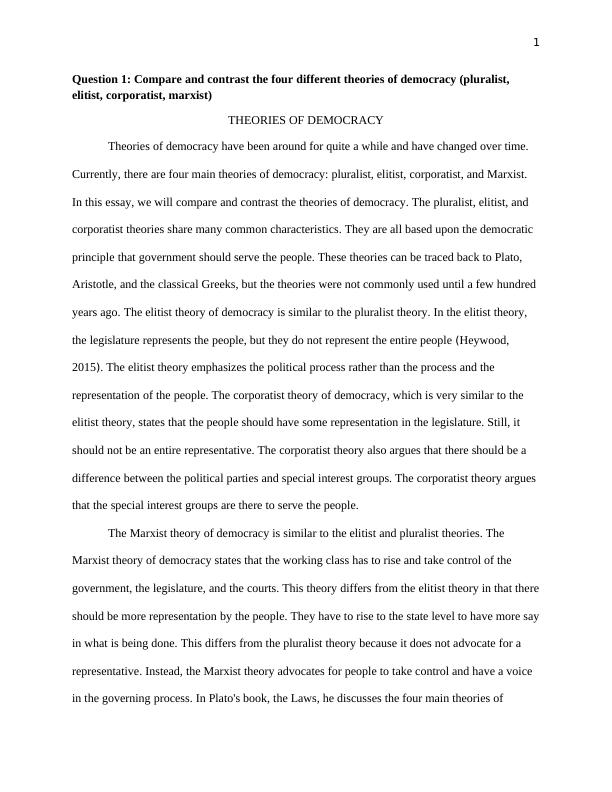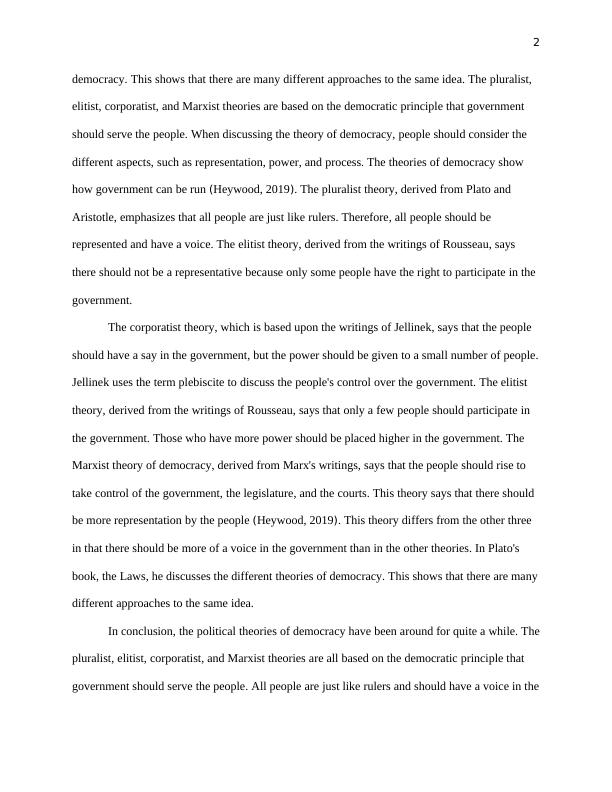Question and Answer on the Theories of Democracy
Added on 2022-09-15
4 Pages853 Words17 Views
1
Question 1: Compare and contrast the four different theories of democracy (pluralist,
elitist, corporatist, marxist)
THEORIES OF DEMOCRACY
Theories of democracy have been around for quite a while and have changed over time.
Currently, there are four main theories of democracy: pluralist, elitist, corporatist, and Marxist.
In this essay, we will compare and contrast the theories of democracy. The pluralist, elitist, and
corporatist theories share many common characteristics. They are all based upon the democratic
principle that government should serve the people. These theories can be traced back to Plato,
Aristotle, and the classical Greeks, but the theories were not commonly used until a few hundred
years ago. The elitist theory of democracy is similar to the pluralist theory. In the elitist theory,
the legislature represents the people, but they do not represent the entire people (Heywood,
2015). The elitist theory emphasizes the political process rather than the process and the
representation of the people. The corporatist theory of democracy, which is very similar to the
elitist theory, states that the people should have some representation in the legislature. Still, it
should not be an entire representative. The corporatist theory also argues that there should be a
difference between the political parties and special interest groups. The corporatist theory argues
that the special interest groups are there to serve the people.
The Marxist theory of democracy is similar to the elitist and pluralist theories. The
Marxist theory of democracy states that the working class has to rise and take control of the
government, the legislature, and the courts. This theory differs from the elitist theory in that there
should be more representation by the people. They have to rise to the state level to have more say
in what is being done. This differs from the pluralist theory because it does not advocate for a
representative. Instead, the Marxist theory advocates for people to take control and have a voice
in the governing process. In Plato's book, the Laws, he discusses the four main theories of
Question 1: Compare and contrast the four different theories of democracy (pluralist,
elitist, corporatist, marxist)
THEORIES OF DEMOCRACY
Theories of democracy have been around for quite a while and have changed over time.
Currently, there are four main theories of democracy: pluralist, elitist, corporatist, and Marxist.
In this essay, we will compare and contrast the theories of democracy. The pluralist, elitist, and
corporatist theories share many common characteristics. They are all based upon the democratic
principle that government should serve the people. These theories can be traced back to Plato,
Aristotle, and the classical Greeks, but the theories were not commonly used until a few hundred
years ago. The elitist theory of democracy is similar to the pluralist theory. In the elitist theory,
the legislature represents the people, but they do not represent the entire people (Heywood,
2015). The elitist theory emphasizes the political process rather than the process and the
representation of the people. The corporatist theory of democracy, which is very similar to the
elitist theory, states that the people should have some representation in the legislature. Still, it
should not be an entire representative. The corporatist theory also argues that there should be a
difference between the political parties and special interest groups. The corporatist theory argues
that the special interest groups are there to serve the people.
The Marxist theory of democracy is similar to the elitist and pluralist theories. The
Marxist theory of democracy states that the working class has to rise and take control of the
government, the legislature, and the courts. This theory differs from the elitist theory in that there
should be more representation by the people. They have to rise to the state level to have more say
in what is being done. This differs from the pluralist theory because it does not advocate for a
representative. Instead, the Marxist theory advocates for people to take control and have a voice
in the governing process. In Plato's book, the Laws, he discusses the four main theories of

2
democracy. This shows that there are many different approaches to the same idea. The pluralist,
elitist, corporatist, and Marxist theories are based on the democratic principle that government
should serve the people. When discussing the theory of democracy, people should consider the
different aspects, such as representation, power, and process. The theories of democracy show
how government can be run (Heywood, 2019). The pluralist theory, derived from Plato and
Aristotle, emphasizes that all people are just like rulers. Therefore, all people should be
represented and have a voice. The elitist theory, derived from the writings of Rousseau, says
there should not be a representative because only some people have the right to participate in the
government.
The corporatist theory, which is based upon the writings of Jellinek, says that the people
should have a say in the government, but the power should be given to a small number of people.
Jellinek uses the term plebiscite to discuss the people's control over the government. The elitist
theory, derived from the writings of Rousseau, says that only a few people should participate in
the government. Those who have more power should be placed higher in the government. The
Marxist theory of democracy, derived from Marx's writings, says that the people should rise to
take control of the government, the legislature, and the courts. This theory says that there should
be more representation by the people (Heywood, 2019). This theory differs from the other three
in that there should be more of a voice in the government than in the other theories. In Plato's
book, the Laws, he discusses the different theories of democracy. This shows that there are many
different approaches to the same idea.
In conclusion, the political theories of democracy have been around for quite a while. The
pluralist, elitist, corporatist, and Marxist theories are all based on the democratic principle that
government should serve the people. All people are just like rulers and should have a voice in the
democracy. This shows that there are many different approaches to the same idea. The pluralist,
elitist, corporatist, and Marxist theories are based on the democratic principle that government
should serve the people. When discussing the theory of democracy, people should consider the
different aspects, such as representation, power, and process. The theories of democracy show
how government can be run (Heywood, 2019). The pluralist theory, derived from Plato and
Aristotle, emphasizes that all people are just like rulers. Therefore, all people should be
represented and have a voice. The elitist theory, derived from the writings of Rousseau, says
there should not be a representative because only some people have the right to participate in the
government.
The corporatist theory, which is based upon the writings of Jellinek, says that the people
should have a say in the government, but the power should be given to a small number of people.
Jellinek uses the term plebiscite to discuss the people's control over the government. The elitist
theory, derived from the writings of Rousseau, says that only a few people should participate in
the government. Those who have more power should be placed higher in the government. The
Marxist theory of democracy, derived from Marx's writings, says that the people should rise to
take control of the government, the legislature, and the courts. This theory says that there should
be more representation by the people (Heywood, 2019). This theory differs from the other three
in that there should be more of a voice in the government than in the other theories. In Plato's
book, the Laws, he discusses the different theories of democracy. This shows that there are many
different approaches to the same idea.
In conclusion, the political theories of democracy have been around for quite a while. The
pluralist, elitist, corporatist, and Marxist theories are all based on the democratic principle that
government should serve the people. All people are just like rulers and should have a voice in the

End of preview
Want to access all the pages? Upload your documents or become a member.
Related Documents
American Historylg...
|4
|558
|84
